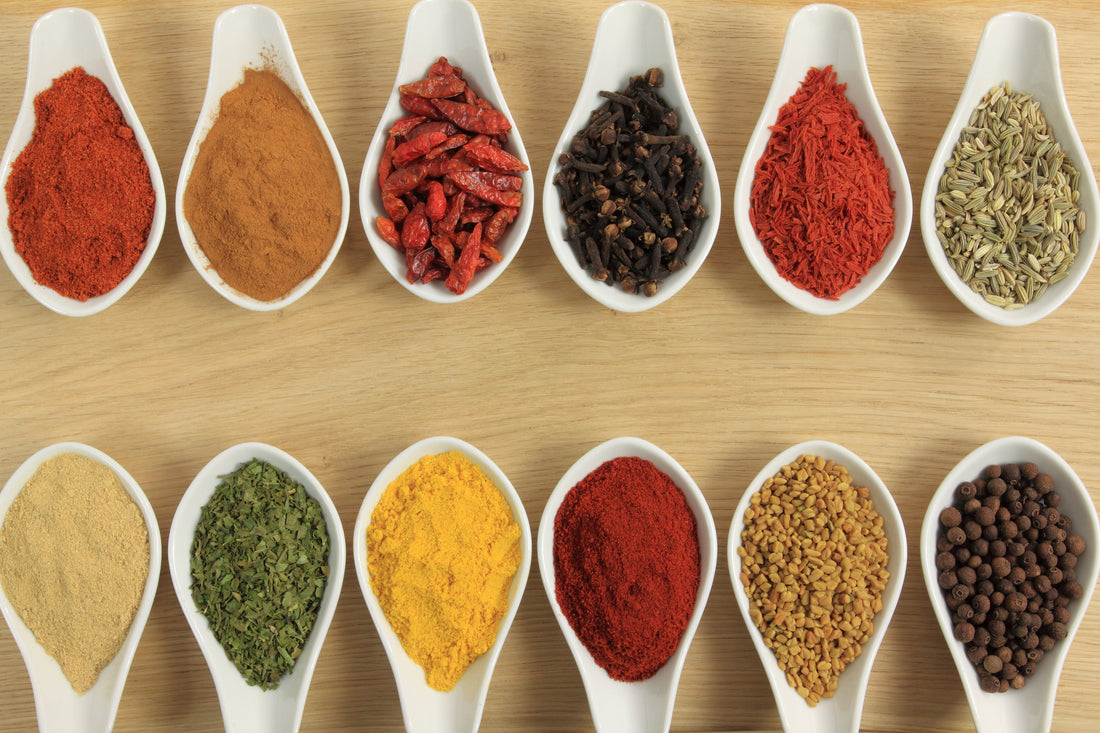
Herbs and spices have been used in cooking since ancient times, not just for flavoring and preserving foods but also for their medicinal qualities. Today, it makes good sense to use herbs and spices in your cooking. They offer a good way to get additional vitamins and minerals in your diet, are a concentrated food, and can positively affect your mind, body, and moods. Turn a boring dish into an exotic meal with one or more of the following medicinal flavoring herbs and spices.
- Basil is a digestive aid. It is one of the few herbs that increase its flavor when cooked. Basil is a good mood and memory enhancer.
- Cardamom is naturally sweet and delicious when added to coffee or teas (chai). It negates the harmful effects coffee has on the liver. If you feel heavy and sluggish after a meal chew some cardamom seeds for an energizing effect, both physically and mentally. Add it to your oatmeal for better and quicker digestion and absorption and to alleviate congestion.
- Cayenne is the mover and shaker. Cayenne’s long list of beneficial and life saving properties are extraordinary. To name just a few, cayenne improves circulation, strengthens heart, arteries, capillaries and nerves.
- Coriander cools hot spicy dishes. The seeds are used in garam masala, chutney, curries, etc. The leaves (cilantro) are used in numerous Mexican dishes.
- Dill improves appetite and digestion. Add dill to fish, lamb and soups. The difference between dill leaf and dill seed lies in the degree of pungency. The seeds are sharper, whereas the leaves enhance rather than dominate the flavor of food. Dill tea or water is a popular remedy in Europe for upset stomach, hiccups, or insomnia. It also promotes the flow of milk in nursing mothers. Gripe water is made with dill and used in children’s medicines to alleviate colic and flatulence. Dill is also a calcium absorber.
- Fennel is excellent to use in oily or fatty dishes, such as meat, fatty fish and stuffing to improve digestion and to prevent both heartburn and constipation. Fennel tea is excellent to relieve colic in children and babies. Fennel tea can be used in facial steams for deep cleansing and for wrinkles. To ease inflammation and watery eyes place a compress of fennel tea on the eyelid.
- Fenugreek can be made into sprouts and is excellent in sandwiches. Place a few fenugreek seeds on a moist paper towel on a windowsill. Keep moist for a few days and watch them sprout. Fenugreek is a refreshing cellular moisturizer. Fenugreek counteracts catarrh and phlegm. Eliminates uric acid through the lymphatic system.
- Garlic is for general health enhancement. It is a strong antibiotic with anti-microbial, anti-fungal and anti-parasitic action. Garlic lowers blood pressure and cholesterol. Garlic’s medicinal properties are too numerous to list all here.
- Ginger is most important in Asian dishes. Ginger increases the absorption of nutrients by approximately 30 percent. Ginger is very effective to prevent and relieve motion sickness.
- Oregano and marjoram (are from the same family, but oregano is wild and marjoram is cultivated) combine well with pizza, meat and tomato sauce and vegetable dishes. It is highly antiseptic, eases colds, flu and sore throats.
- Parsley is a multivitamin herb and a breath freshener. Parley relieves edema, frequent urination, gas, infant colic (via breast milk) and bilious colic.
- Peppermint is a multipurpose herb. It has an refreshing, deodorizing and energizing effect.
- Rosemary is one of the most useful culinary herbs and combines well with meat, casseroles, tomato sauces, baked fish, rice, salads, egg dishes, apples, vinegars and oils. Rosemary increases blood circulation, stimulates the smooth muscle of the digestive tract and gallbladder, increasing the flow of bile. It can also be used for headaches, as a memory enhancer, for bad breath and to make your skin beautiful.
- Sage has preservative properties and can kill off harmful bacteria in foods. Sage aids digestion of fatty food. As a tea it reduces perspiration and hot flashes
- Tarragon is also known as estragon, and compliments many dishes such as chicken, fish, rice and salad. Tarragon relieves indigestion and spasms.
- Thyme is an aid to digestion and helps break down fatty foods. It is good added to marinades, stews and soups.Thyme has strong antiseptic properties and is excellent for sore throats and infected gums. Helps ease rheumatic pain.
- Turmeric is used in curry, lentil, rice and grain dishes used mostly in traditional Indian cooking. Turmeric stimulates and improves digestion, assists in protein digestion and purifies the blood, as well as improving intestinal flora. Turmeric is a great antioxidant and anti-inflammatory, excellent for arthritic conditions.
Have fun experimenting with the great varieties of herbs and spices available to you. Let your imagination guide you, excite your taste buds and improve your health. Bon appetite!
What Is An Herb And What Is A Spice
Both herbs and spices come from plants – sometimes from the same plant. It’s which part of the plant that makes a difference. The Oxford English Dictionary defines an herb as “a plant of which the leaves, stems and flowers are used for food or medicine, or in some way for their scent or flavor”. A spice is “an aromatic vegetable product used to season or flavor foods”. Herbs, for example basil, cilantro and tarragon are the leaves from plants. Spices can be seeds (such as fennel), seed pods (such as cardamom), berries (juniper), buds (cloves), rhizome (ginger), even bark (cinnamon) – just about any part of a plant except the leaves.
Written by Leilah

